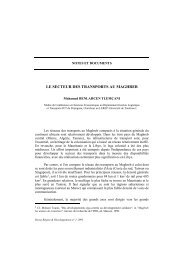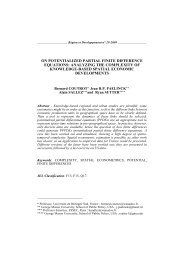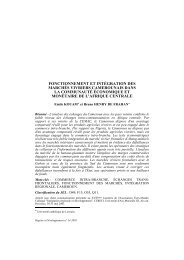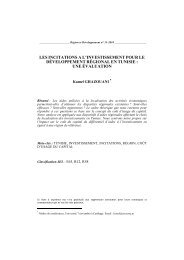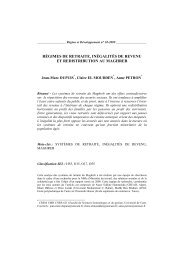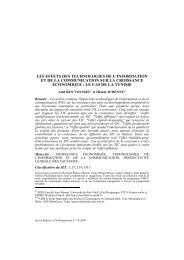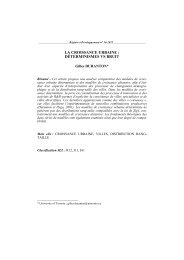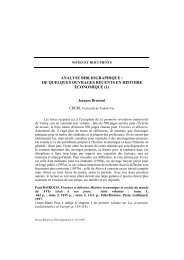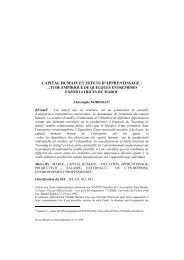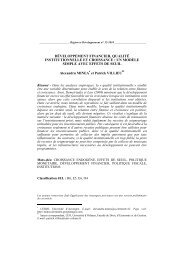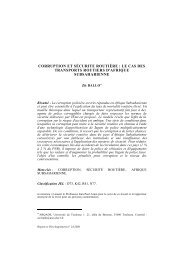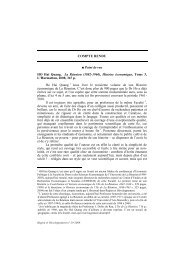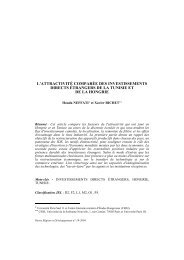space and growth: a survey of empirical evidence ... - ResearchGate
space and growth: a survey of empirical evidence ... - ResearchGate
space and growth: a survey of empirical evidence ... - ResearchGate
You also want an ePaper? Increase the reach of your titles
YUMPU automatically turns print PDFs into web optimized ePapers that Google loves.
18 Maria Abreu, Henri L.F. de Groot <strong>and</strong> Raymond J.G.M. FloraxAlthough the bulk <strong>of</strong> this section will be concerned with models <strong>of</strong>absolute location, there are a few studies in the non-spatial econometricsliterature that deal with relative location, notably studies <strong>of</strong> spillovers <strong>and</strong>technology diffusion. We conclude this section by discussing their significance,<strong>and</strong> how they relate to the spatial dependence models typically estimated in thespatial econometrics literature that will be reviewed in Section 2.2.Within the literature using models <strong>of</strong> absolute location there are somestudies that incorporate geographical variables directly into the analysis, so that<strong>growth</strong> is a function <strong>of</strong> variables that are invariant over time <strong>and</strong> thereforeexogenous (since they precede economic <strong>growth</strong> <strong>and</strong> development). Typicalexamples are Hall <strong>and</strong> Jones (1996), Sachs <strong>and</strong> Warner (1997) <strong>and</strong> Lee et al.(1997), who find that latitude is a negative determinant <strong>of</strong> <strong>growth</strong>, aftercontrolling for other social, political <strong>and</strong> economic factors.Another part <strong>of</strong> the literature deals with the indirect effects <strong>of</strong> geographythrough different channels. The idea is that geographical variables can be used asinstruments for other variables that have a direct effect on <strong>growth</strong>. Onehypothesis linking absolute location with <strong>growth</strong> emphasizes the higherincidence <strong>of</strong> infectious diseases in the tropics. Among them, malaria is unique inthat it is not a consequence <strong>of</strong> poverty, <strong>and</strong> the feasibility <strong>of</strong> eradicating it ismainly determined by climate <strong>and</strong> ecology. This allows the authors to either treatit as exogenous, or to instrument it using geographical variables. Bloom <strong>and</strong>Sachs (1998) <strong>and</strong> Gallup <strong>and</strong> Sachs (2001) find that the incidence <strong>of</strong> malaria hasa negative effect on economic <strong>growth</strong>, after controlling for other variablesrelated to policy, human capital <strong>and</strong> general health.A related channel through which geography can have an impact on <strong>growth</strong>is agriculture. Agricultural productivity in the tropics is low because tropicalsoils are poor in nutrients (winter frost is essential for creating a rich topsoil) <strong>and</strong>susceptible to erosion, rainfall is variable, <strong>and</strong> pests <strong>and</strong> diseases are widespread(again due to the lack <strong>of</strong> winter frost). In addition, only a small amount <strong>of</strong>agricultural research is carried out with tropical agriculture in mind, <strong>and</strong> whilemachines <strong>and</strong> other equipment can be used across climate zones, new cropvarieties need to be adapted to tropical climates. Gallup <strong>and</strong> Sachs (2000) findthat agricultural productivity <strong>growth</strong> is substantially lower in the tropics, whileMasters <strong>and</strong> McMillan (2001) show that <strong>growth</strong> increases sharply with thenumber <strong>of</strong> days <strong>of</strong> winter frost, particularly at low levels <strong>of</strong> frost.The relationships found in the literature on geography <strong>and</strong> <strong>growth</strong> have ledto a debate on the relative merits <strong>of</strong> geography, policy <strong>and</strong> institutions inexplaining long-run <strong>growth</strong>. It has been argued that the quality <strong>of</strong> institutions <strong>and</strong>policy may be affected by geographical <strong>and</strong> climatic conditions. For example,Acemoglu et al. (2001) argue that settler mortality rates in the European coloniesdetermined whether or not the colony became an extractive state with weak




